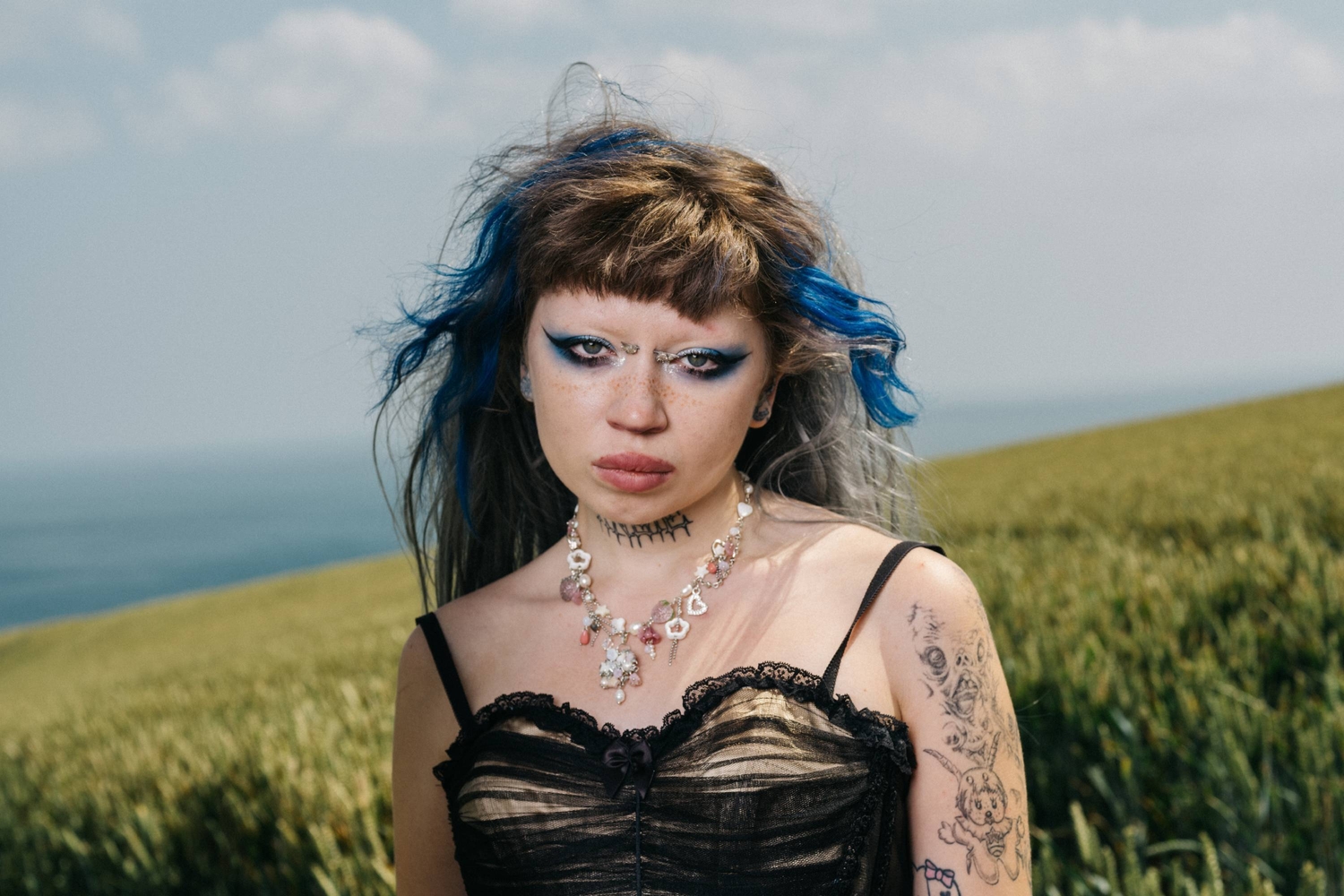
Jazmin Bean: Survivor
Unbeknownst to the legion of fans who’ve watched Jazmin Bean’s rise to cult stardom, the singer’s life for almost a decade has been one filled with unimaginable horrors. On debut album ‘Traumatic Livelihood’, they’re finally ready to tell their story.
Trigger warning: the following interview contains material relating to grooming and sexual abuse.
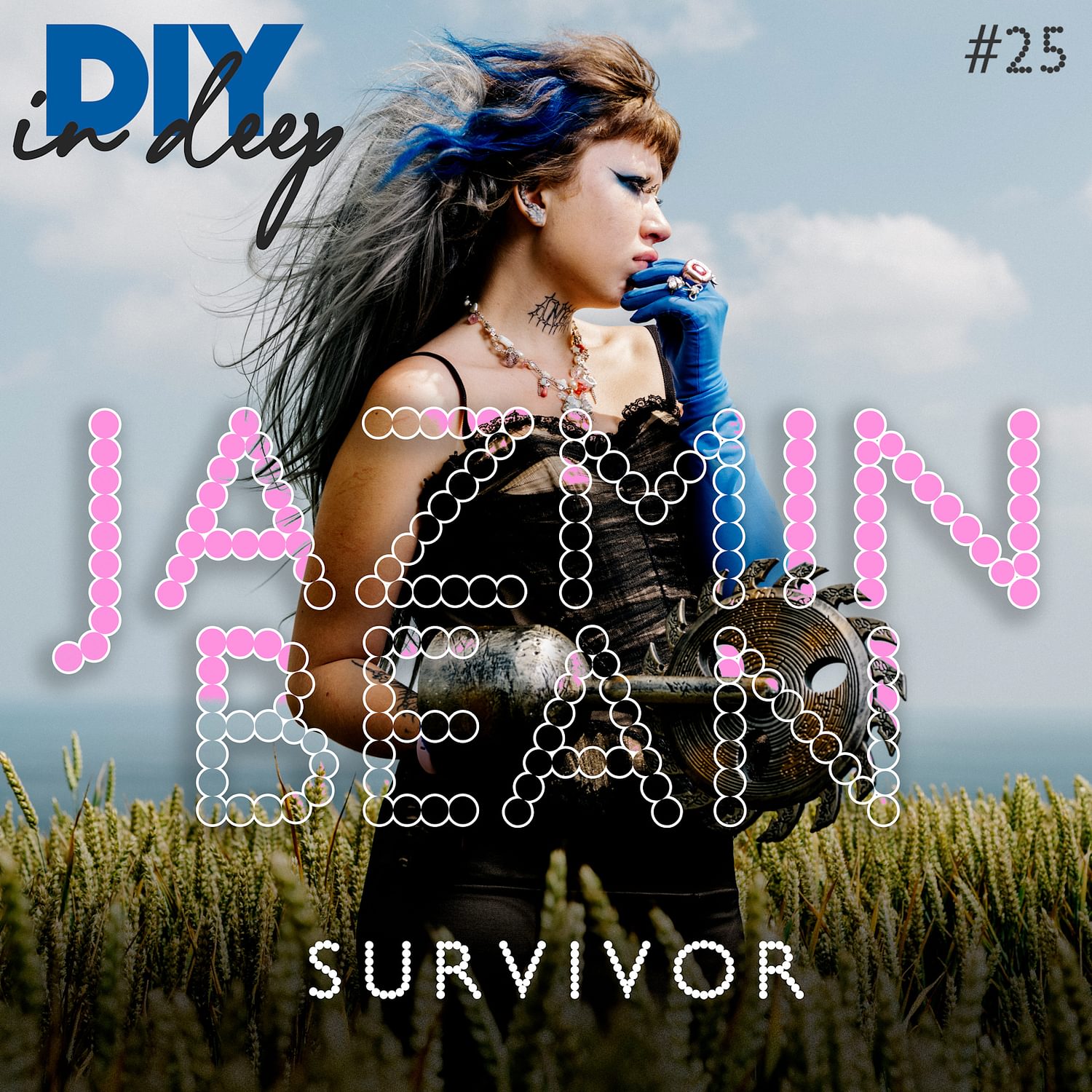
14-year-old Jazmin Bean was going to the US, but they couldn’t tell their friends. Even if they could, they didn’t know how to. It wasn’t for a holiday, and it wasn’t to visit family. “I was groomed by a man that was much older than me,” Bean says, plainly.
They’re sitting down on a kerb in LA, basking in the sunshine. “I’m very happy to not be in British weather right now,” they say over Zoom. “I prefer the sun so, so much.”
We’re talking about their debut album, ‘Traumatic Livelihood’. It’s an album that Bean’s fans have been clamouring for since they broke out on the scene in 2020 - and there are approximately 900,000 of those fans now on TikTok alone. Back at that time, Bean was known for their extreme beauty style, love of anime, and their shocking performance tactics. Their debut EP ‘Worldwide Torture’ - released aged 17 - spawned some of the tracks (‘Yandere’ and ‘Hello Kitty’) that remain their biggest hits to date.
But in reality, a lot was going down behind the scenes. In June 2022, Bean announced they had been in rehab for a few months. It was a decision that had been a long time coming after four years of struggling with addiction - particularly with ketamine - that started around the same time they began being groomed.
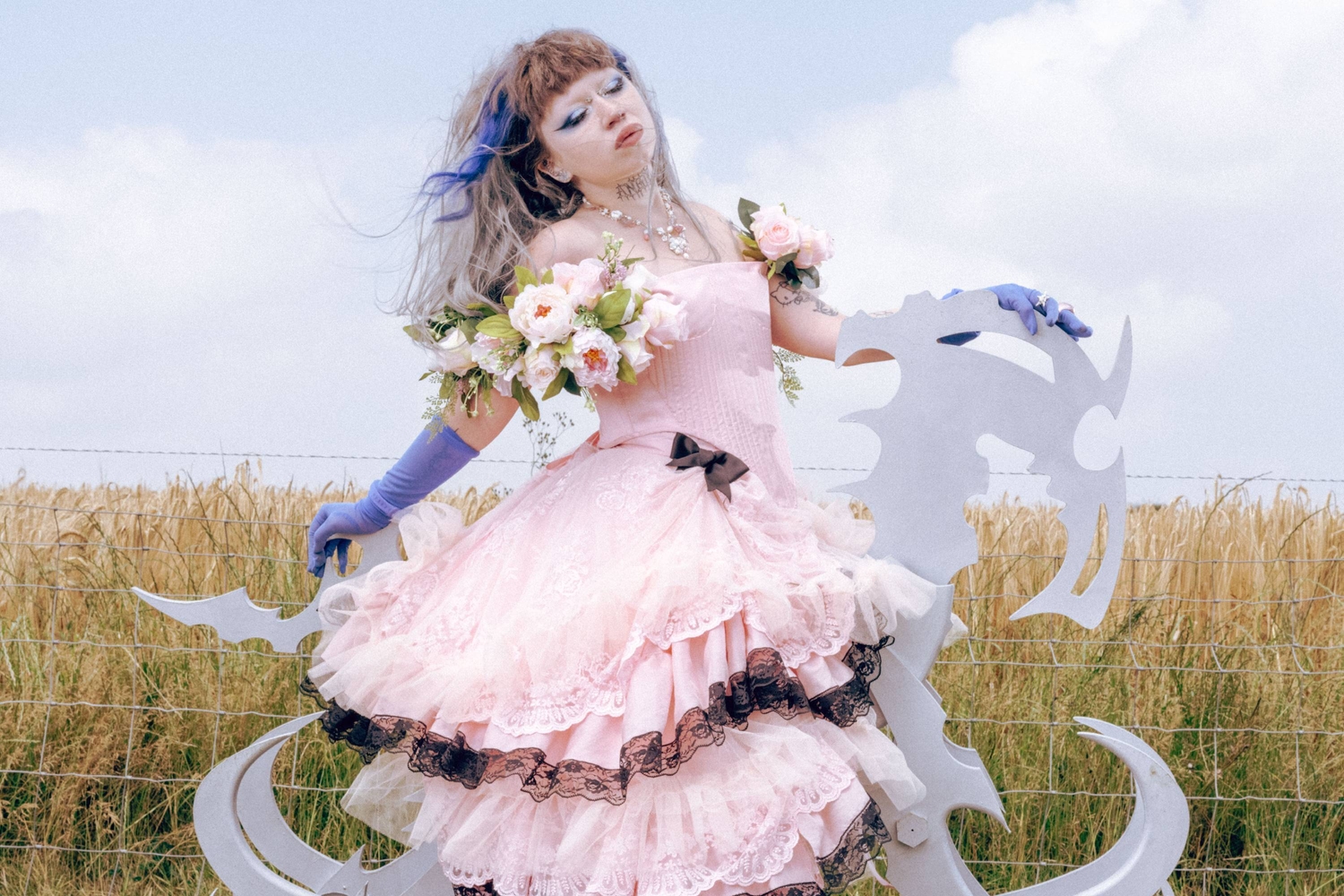
“I was around 14 when that happened,” Bean begins. “I was being shipped back and forth across the world and obviously exploited quite badly, sexually, and isolated from a lot of friends and family. I was trapped in this one bedroom in the Bronx, not really knowing what was going on.”
As a result, they turned to drugs to cope. “A lot of my drug usage at a young age came from that repressed memory and blocked that trauma,” they explain. “Your brain blocks out trauma and I just started remembering things that I didn't even know happened. And so that was a lot for me to overcome mentally.”
Just years later, and still in the grip of addiction, Bean would simultaneously rise to fame as one of the most exciting names in alternative music. They were only 16 when they released ‘Hello Kitty’, which now has 23 million views on YouTube. It’s a raging speed-metal track whose accompanying video features the singer’s famous makeup style at the time; like the track’s titular animated feline was glitched out and turned into a demon. But even then, there were signs in Bean’s music that something wasn’t right: “One day I'm gonna get stretched too hard and snap like a rubber band,” they sing.
Through it all, they would continue to release music that showcased the singer’s wild creativity. 2022’s ‘Puppy Pound’ is set to a punishing bark, while Bean struts around in a fluffy pink dress with slick black latex gloves and boots. But at that point, they were in LA “with the wrong people and no parental guidance, making song after song after song”.
Bean, knowing they had hit rock bottom, decided to go to rehab. It’s a move which their label, Island Records / Interscope, was entirely supportive of and even paid for, and is something Bean believes every label should offer. “The data shows that musicians are bad with addiction!” they exclaim. “I don’t know the science behind it, but the stories are plentiful. I’m really appreciative that they understood my journey and welcomed me back with open arms.”
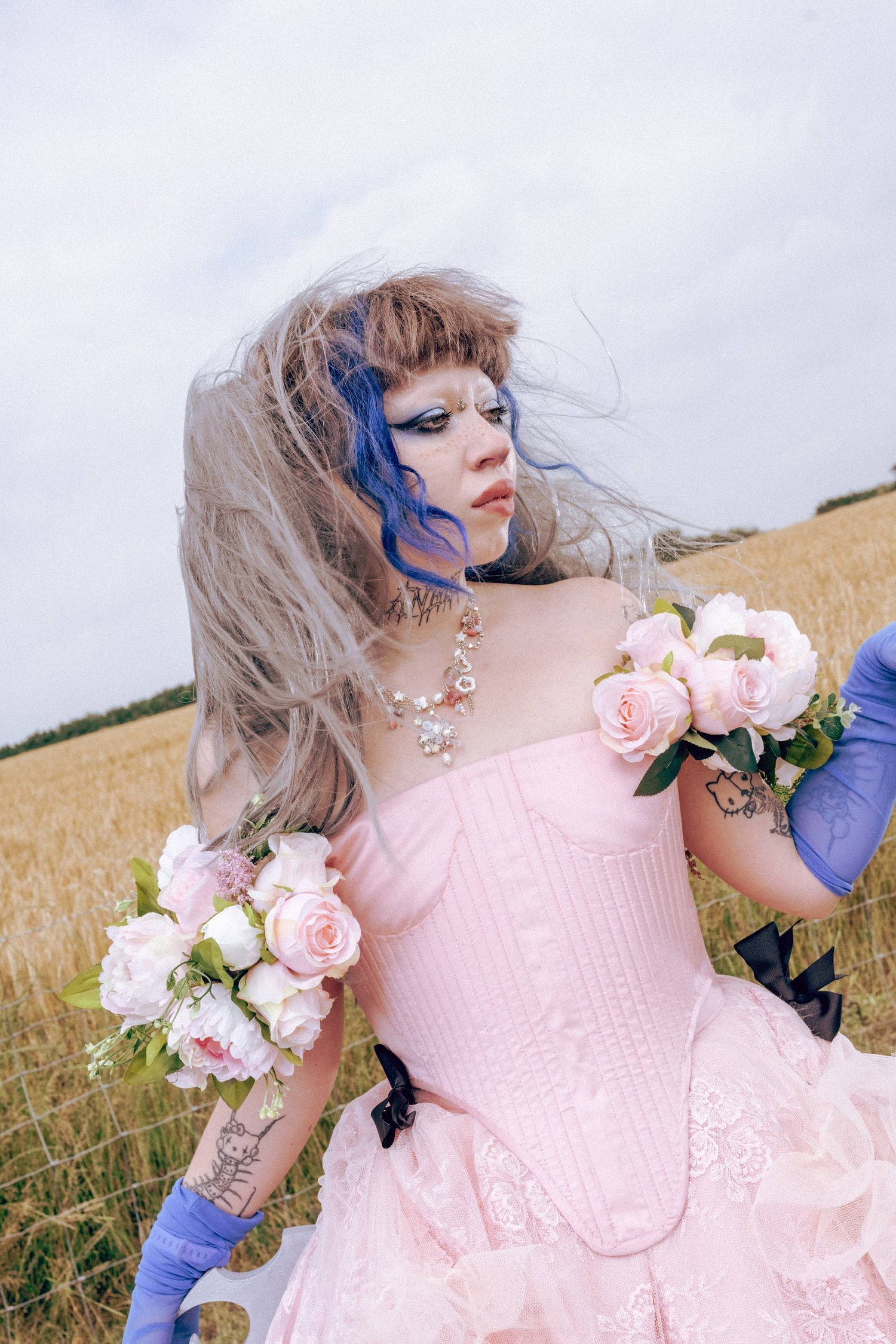
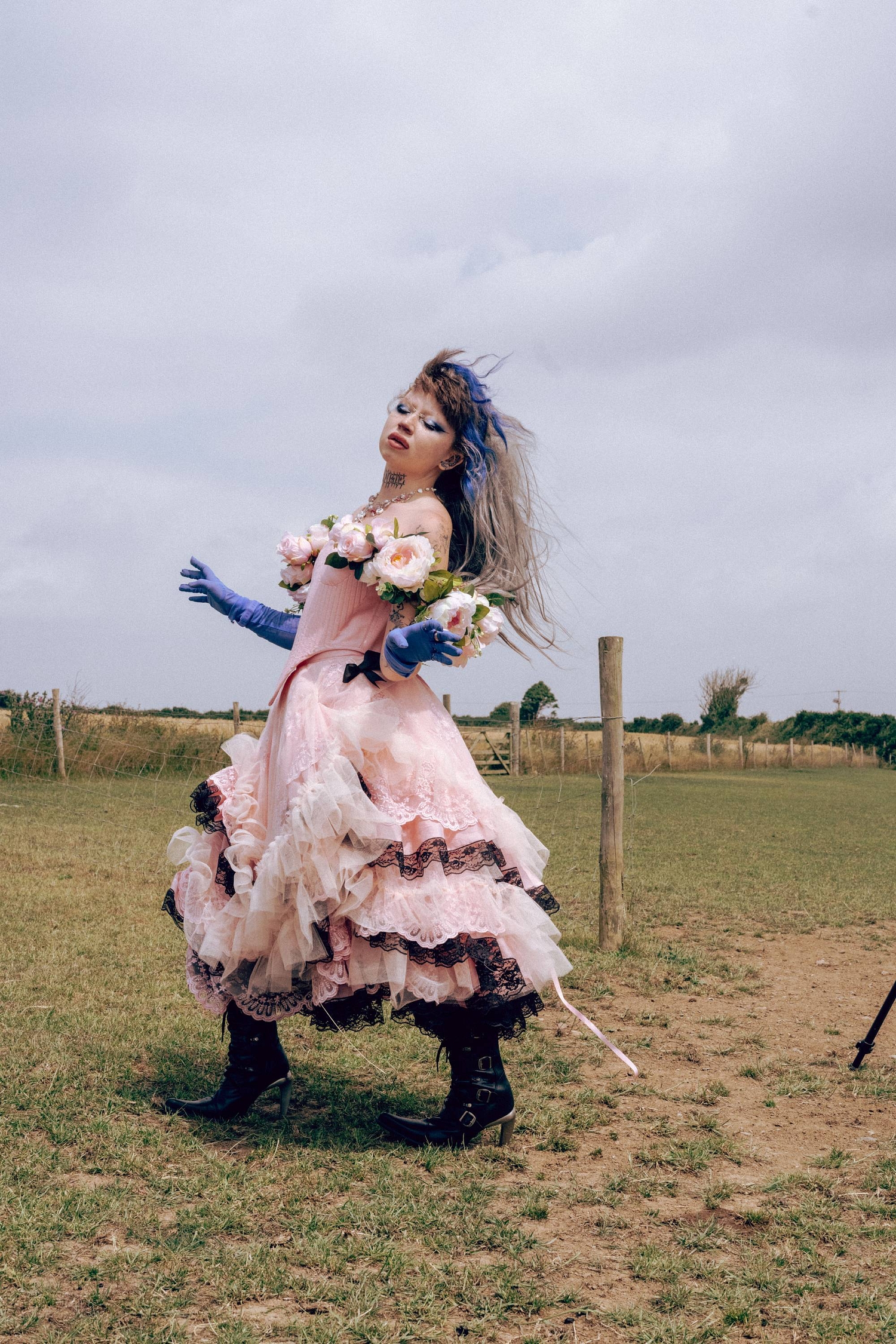
Emerging from rehab, Bean listened back to what was supposed to be their debut album. What they found, however, was a project that sounded like “a cry for help”. “This album sounds like it's coming from someone who is on a lot of drugs and really unwell,” they recall thinking. “It wasn't aligning with my point of view or what I wanted to do with my style.”
Additionally, Bean felt the album was “trying too hard to do all the different genres that were popping off”. Though they concede that “there were some good songs”, they decided to scrap the album and start fresh with new material they could relate to.
So Bean got back in the studio, at first nervous about the songwriting process. But once they began writing, they realised they were uncovering parts of themself they didn’t even know they had lost. “When I got out of rehab and I got back in the studio, I was like, wait – I'm actually really good at writing songs!” they laugh. “I didn't know because I would be falling asleep in the studio all the time, not being able to focus, because I'm just thinking about the next high. It's all consuming.”
‘Traumatic Livelihood’, ‘Shit Show’ and ‘Favourite Toy’ were the first three songs Bean wrote for the album, and they sparked their energy for the rest of the process. “Those are the first songs that I wrote where I was like, ‘OK, I think I have something’,” says Bean. “There was so long of not being truly fulfilled by songs, but this whole album has [given me] loads of that.”
Pulled from upwards of a hundred possible songs, the ones that made the cut for ‘Traumatic Livelihood’ form a purposely happy body of work. “I just wanted it to feel optimistic in some way and not just rotting in my pain,” they explain. “Yes, I’m talking about sad stuff, but I wanted to make it clear that I'm acknowledging it in some way. I feel like a lot of sad music is ‘I'm sad and it's not going to get better, I don't want it to get better’. I didn't want it to be like that.
“All my past music was just like: ‘I'm mad. I'm angry. I don't know why I'm angry and I have no solution, but I'm angry’,” they continue. “I wanted to acknowledge that there is a solution. I didn't want it to become music to be sad to. It sounds really happy in my opinion, but I don't know… Maybe my brain is warped.”
‘Traumatic Livelihood’ also sees the singer shifting out of their previous makeup style, opting for a more exaggerated yet glamorous look. Was it nerve-wracking to enter this new aesthetic phase? “For sure, I definitely felt nervous,” Bean agrees, “but I didn't have any other option. I really don’t align with the other stuff. There’s always going to be those people that are like, ’Please don't grow. Please keep doing the thing that you were doing last time’. But they are always going to be there.”
This new release will also cement Bean’s move to a major label, where previously they self-released music under their own independent record label, Aswang Birthday Cake. How do they feel about the move to becoming more "mainstream" given that they began in the underground? “I don't mind,” they say. “I feel like everyone makes "mainstream" out to be a really bad thing, but I don't think it's bad, it's different.
“There's a difference between being cool and being underground,” they continue. “People go, ‘Oh, you're not underground. Well you must not be cool.’ But underground just means that not enough people are listening to you, it doesn't mean that you're more or less ‘cool’. And I think there's this misconception with the word mainstream that it means any less ‘good’ or ‘cool’. It just means more people are listening to you, and isn’t that the goal?
There’s also a surprise curveball on ‘Traumatic Livelihood’ in the form of ‘Terrified’ that celebrates that most mainstream topic of them all: love. Reminiscent of a classic Avril Lavigne anthem, it was also the song Bean felt most nervous for; “It’s probably the most different one in the whole album,” they note.
“I just wanted to make one song that appreciated love that wasn’t talking about how bad it is, because I feel like I never hear anyone talking about that,” they say. “Everyone is like, ‘I've lied or I've cheated or I've been cheated on and love is terrible and fuck you.’ I write loads of songs like that too, so I was like, let’s try and make one song where it's nice.”
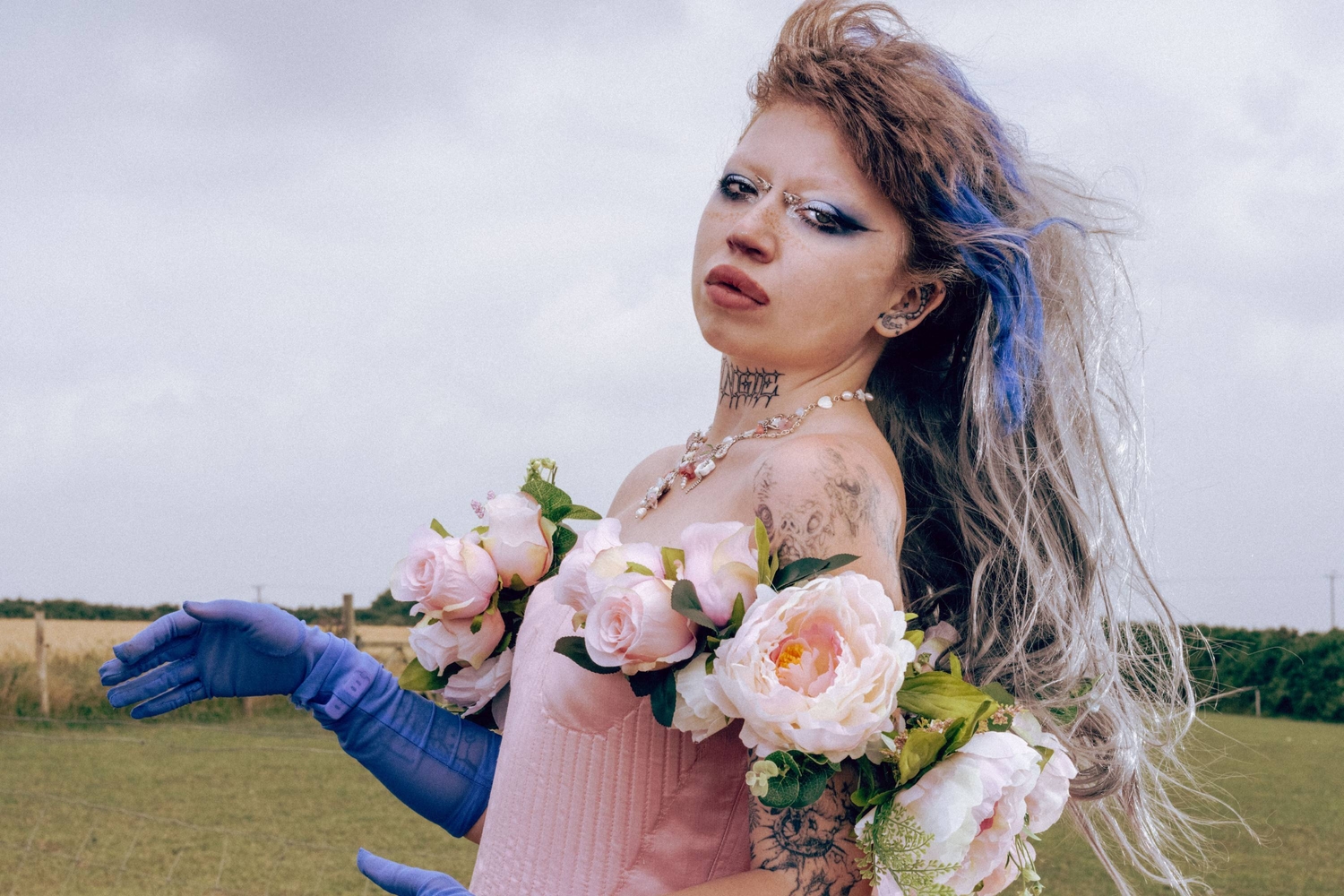
For the most part, however, ‘Traumatic Livelihood’ is a raw document of Bean’s singular life, of overcoming their past and carving out a new future. “It's a very weird experience,” they admit. “It's hard not being able to find stories that I relate to. But someone said to me: ‘Maybe you're just going to have to be that story for someone else’. That was a really hard pill to swallow.”
There’s the mournful ballad ‘Black Dress’, which Bean says is about their time adjusting to being sober after rehab, looking back on their old friends. “That’s about how weird it is being finally on the outside and watching everything that I was just in from this whole different lens,” they say. “It feels so different. It came from the heart, but I think it came from a judgmental place on the struggling addict, feeling like I was higher up because I got out of it. But I’m just like them, except I got to go to rehab.”
There are also songs that hint at the aftermath of what Bean went through as a teenager. Recently they attempted to pursue a legal case, to no avail. “The courts absolutely failed me,” they say, resigned. “They had so much evidence, and it’s a very extreme situation of grooming that happened to me. I had pictures, everything to prove it. And they just said that your evidence is not viable in court. They just put a restraining order on it and let him back into the world. That was a really hard one to get through this year.”
As such, there are complicated emotions that they’ve been left with, which they address on the soaring, grand ‘Stockholm Butterfly’, where they outright sing: “Part of me wishes you’d die / My inner child would crack a smile”.
“It's quite a harsh thing to wish death on someone,” they admit. “But for me it was like, I just wish that you would die so that I wouldn't have the option to have you on this earth and be left with that. And also, so no one else gets to experience you, because the victims are plentiful. No one’s story is taken seriously enough by the legal system for it to matter. I had the most extreme story out of everyone and they didn't take me seriously. So why would the other victims come forward?”
Bean has hinted at the situation over the years, but struggled to find a way to address it. “I've never really understood the right way to open up about it online,” they say. “Because I don't know the right terms to use.” It was also partially about how to communicate the outcome; Bean felt a certain amount of pressure to adhere to a specific narrative. “They kind of just said, ‘If you take this to court, it's not going to work out for you – allow us to do a restraining order and move on with your life’,” they say. “And that felt very like, now I can't share my story because it's not this heroic thing. But it doesn't have to be a hero story.
“Sometimes that story can be: this serial molester, and serial groomer is still out in the world, and the system failed me,” they continue. “But in my mind, I thought I was going to have this big victory story. Yes, he's in jail! Everyone rejoice! Now I can post an Instagram picture explaining this thing that I vaguely talk about all the time, but I never quite talk about. So when my case fell through, I just felt like, this is going be my little secret forever.”
‘Traumatic Livelihood’, then, is Jazmin Bean’s way of finally putting their story out in the world. “I didn't understand what PTSD really was,” they say. “We see it in films and it's this whole flashback moment, but it's not like that, I've come to discover. I'm only just now realising that it works in many different ways. It's been weird just not knowing how to open up about it. And music was the one way in that time of trying to get through that.
“I'm hoping someone can listen to it and it will help them,” they conclude. “I know how hard it is.”
‘Traumatic Livelihood’ is out 23rd February via Island Records/ Interscope.
If you - or someone you know - has been affected by the topics discussed in this article, you can seek help and support by visiting the following websites: napac.org.uk / survivorsuk.org / victimsupport.org.uk / samaritans.org